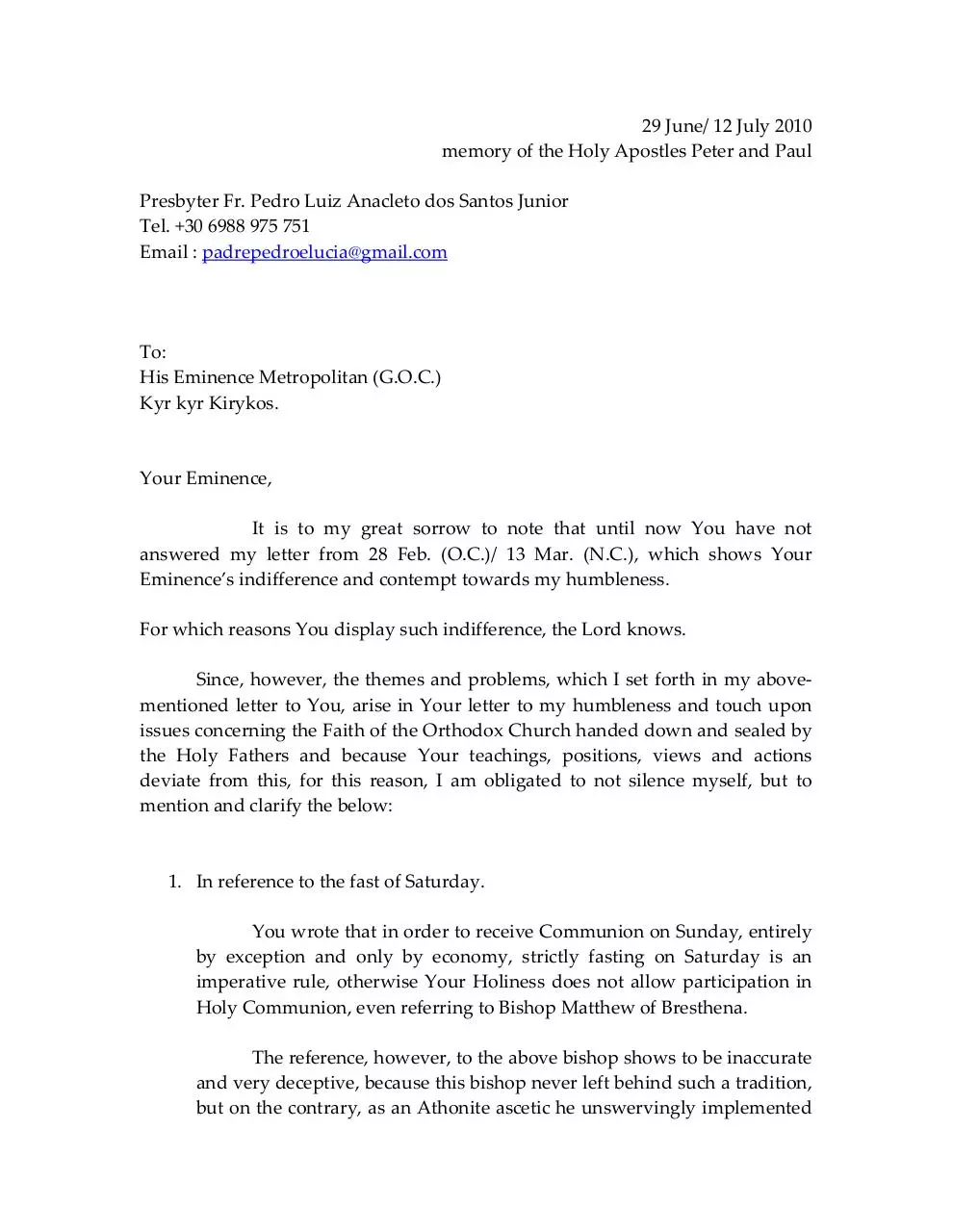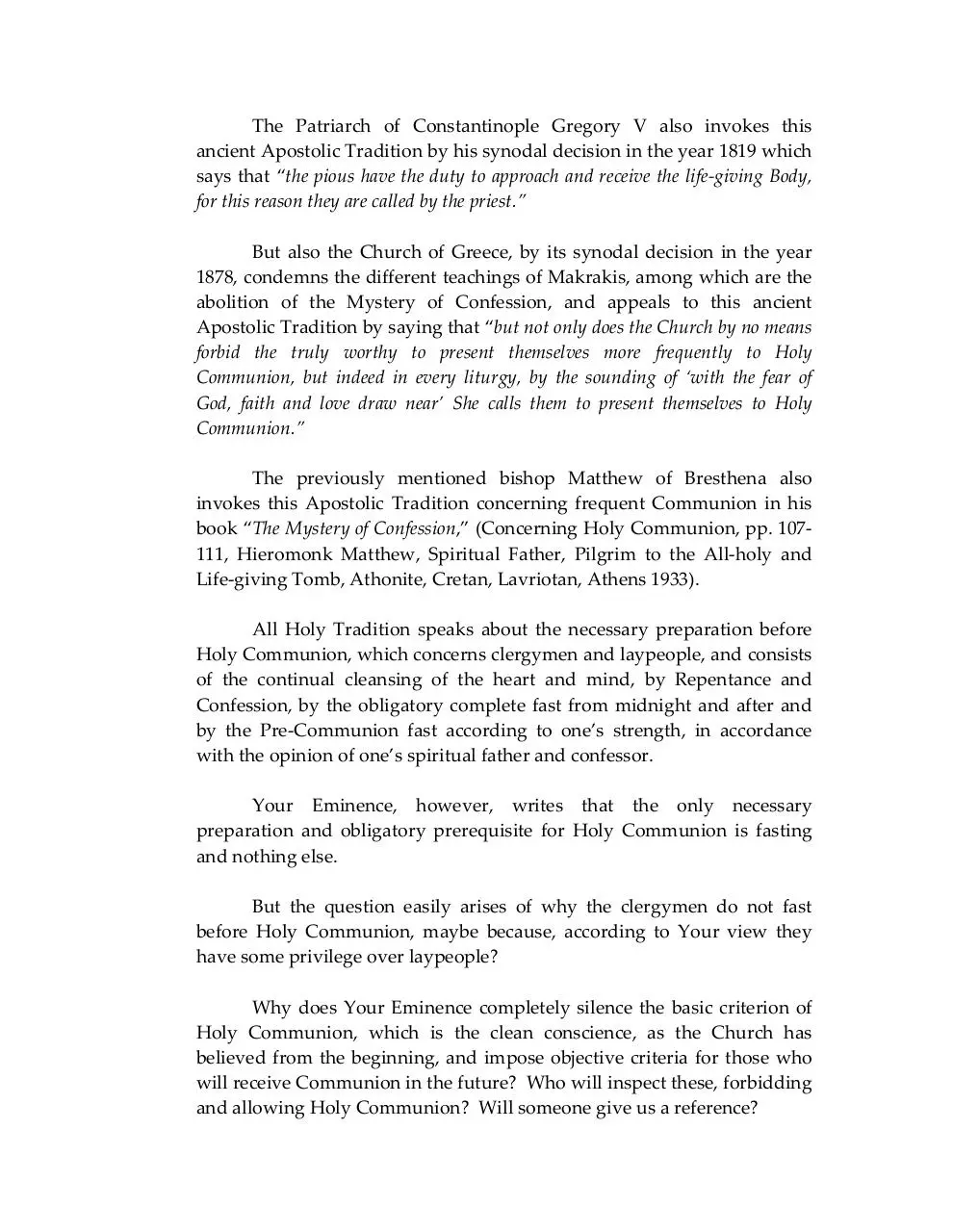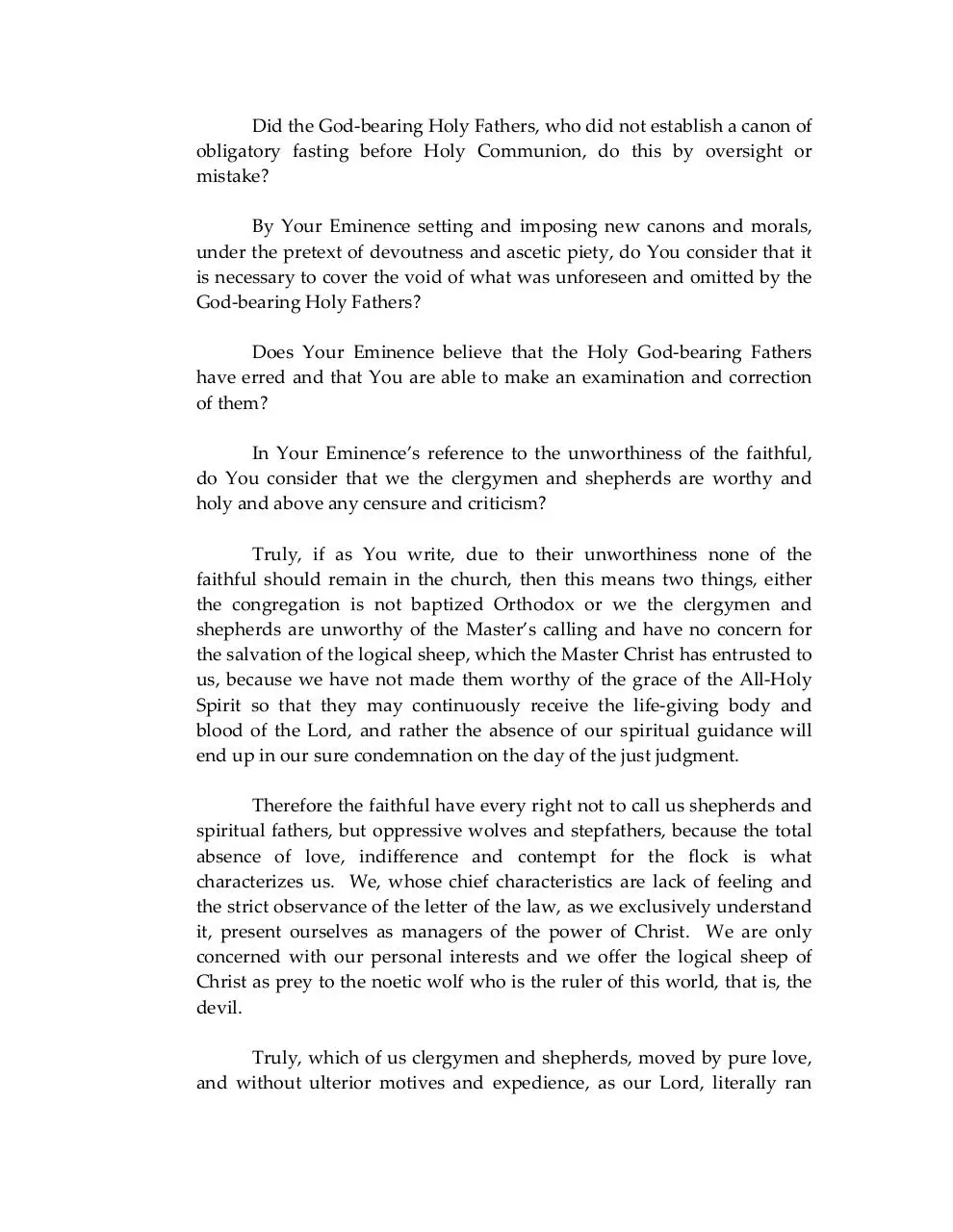padrepedro 02 eng (PDF)
File information
Title: 29 June/ 12 July 2010
Author: Theoharis
This PDF 1.4 document has been generated by Acrobat PDFMaker 8.1 for Word / Acrobat Distiller 8.1.0 (Windows), and has been sent on pdf-archive.com on 23/09/2014 at 09:56, from IP address 46.176.x.x.
The current document download page has been viewed 759 times.
File size: 147.87 KB (9 pages).
Privacy: public file





File preview
29 June/ 12 July 2010
memory of the Holy Apostles Peter and Paul
Presbyter Fr. Pedro Luiz Anacleto dos Santos Junior
Tel. +30 6988 975 751
Email : padrepedroelucia@gmail.com
To:
His Eminence Metropolitan (G.O.C.)
Kyr kyr Kirykos.
Your Eminence,
It is to my great sorrow to note that until now You have not
answered my letter from 28 Feb. (O.C.)/ 13 Mar. (N.C.), which shows Your
Eminence’s indifference and contempt towards my humbleness.
For which reasons You display such indifference, the Lord knows.
Since, however, the themes and problems, which I set forth in my above‐
mentioned letter to You, arise in Your letter to my humbleness and touch upon
issues concerning the Faith of the Orthodox Church handed down and sealed by
the Holy Fathers and because Your teachings, positions, views and actions
deviate from this, for this reason, I am obligated to not silence myself, but to
mention and clarify the below:
1. In reference to the fast of Saturday.
You wrote that in order to receive Communion on Sunday, entirely
by exception and only by economy, strictly fasting on Saturday is an
imperative rule, otherwise Your Holiness does not allow participation in
Holy Communion, even referring to Bishop Matthew of Bresthena.
The reference, however, to the above bishop shows to be inaccurate
and very deceptive, because this bishop never left behind such a tradition,
but on the contrary, as an Athonite ascetic he unswervingly implemented
the Orthodox Tradition concerning Saturday and Sunday and the
refrainment of fasting on these days.
In order to reinforce Your assertion, You gave me, through Fr.
Panteleimon of Croatia, a book entitled Concerning Holy Communion, by
Archbishop Andrew of the G.O.C. of Athens and all Greece (Athens 1992),
which is inaccurate and presents an arbitrary throng of excerpts of official
texts of the Church, where it is quoted that “he who wishes to receive
Communion on Sunday, is obliged to fast on Saturday identically as on Friday,”
(footnote p. 40).
The above, however, are absolutely contrary to the Holy Tradition
of the Church, namely the 64th Apostolic Canon and the 55th Canon of the
First‐Second Council, which states that “If any Clergyman is found fasting on
Sunday, or on Saturday with the exception of one only, let him be deposed from
office. If, however, he is a layman, let him be excommunicated.”
According to Your Eminence’s view, are the faithful able to receive
Communion on Feasts of the Lord or the Mother of God or in
remembrance of Saints if these fall on a Monday or Tuesday? Should they
then fast also on Sunday?
Does Your ordered fast on Saturday only concern laymen?
2. In reference to the preeminence of Sunday.
You write that the only day on which the faithful are able to receive
Communion is Saturday, strictly urging them not to receive Communion
on Sunday, thus denying the ancient Apostolic tradition as well as the
Paschal character of Sunday and the age‐old practice of the Church, thus
introducing a multitude of innovations.
The Holy Tradition of the Church, however, honors Sunday, the
first day after the Sabbaths, as the preeminent day of the week and invites
the faithful to receive Holy Communion on this Resurrectional and
Paschal day.
By Your Eminence attributing a great importance to Saturday as the
preeminent day to receive Communion and nearly forbidding this on
Sunday, as unsuitable for receiving the Immaculate Mysteries, You are
professing a return to Jewish morals and customs and spreading Judaized
opinions in violation of the anathema of the Holy Canons.
3. In reference to the Mystery of Holy Communion
The Orthodox Church, guarding the ancient Apostolic tradition,
does not only urge the participation in the preeminent Mystery, but
requires, by the 8th and 9th Apostolic Canons, the 66th and the 80th canons of
the 6th Ecumenical Council and the 2nd canon of the Council in Antioch, all
of the faithful in church, laypeople and clergymen to partake of the
common Chalice, under the penalty of excommunication and deposition.
Only the prohibited, those who have fallen into mortal sins, are
excluded from this Eucharistic participation, by the suggestion of their
spiritual father and confessor, as the 102nd canon of the 6th Ecumenical
Council dictates.
The philokalic fathers, who were mockingly called Kollyvades by
everyone, from their adversaries to their mortal enemies, were attempting
to revive and teach this ancient, revered Apostolic Tradition on the Holy
Mountain and were criticized and slandered and sent away from Athos
and some of them were killed.
So it is a valid apprehension as to why Your Eminence remains
completely silent and openly ignores the now known book of the
philokalic fathers, which is the book of Saints Makarios Notaras, formerly
of Corinth, and Nikodemos of the Holy Mountain, Concerning the
Continuous Communion of the Immaculate Mysteries of Christ, which
constitutes a summary and recapitulation of the teachings of the Holy and
God‐bearing Fathers about the Mystery of Holy Communion, and as such
proclaims both the synodal decision of Patriarch Neophytos of
Constantinople from Maroneia, and the synodal decision of the Church of
Greece in 1886.
It is strange that this very well known book is absent from the
sources and references about Holy Communion in the above mentioned
book by Archbishop Andrew of the G.O.C., Concerning Holy Communion.
The Patriarch of Constantinople Gregory V also invokes this
ancient Apostolic Tradition by his synodal decision in the year 1819 which
says that “the pious have the duty to approach and receive the life‐giving Body,
for this reason they are called by the priest.”
But also the Church of Greece, by its synodal decision in the year
1878, condemns the different teachings of Makrakis, among which are the
abolition of the Mystery of Confession, and appeals to this ancient
Apostolic Tradition by saying that “but not only does the Church by no means
forbid the truly worthy to present themselves more frequently to Holy
Communion, but indeed in every liturgy, by the sounding of ‘with the fear of
God, faith and love draw near’ She calls them to present themselves to Holy
Communion.”
The previously mentioned bishop Matthew of Bresthena also
invokes this Apostolic Tradition concerning frequent Communion in his
book “The Mystery of Confession,” (Concerning Holy Communion, pp. 107‐
111, Hieromonk Matthew, Spiritual Father, Pilgrim to the All‐holy and
Life‐giving Tomb, Athonite, Cretan, Lavriotan, Athens 1933).
All Holy Tradition speaks about the necessary preparation before
Holy Communion, which concerns clergymen and laypeople, and consists
of the continual cleansing of the heart and mind, by Repentance and
Confession, by the obligatory complete fast from midnight and after and
by the Pre‐Communion fast according to one’s strength, in accordance
with the opinion of one’s spiritual father and confessor.
Your Eminence, however, writes that the only necessary
preparation and obligatory prerequisite for Holy Communion is fasting
and nothing else.
But the question easily arises of why the clergymen do not fast
before Holy Communion, maybe because, according to Your view they
have some privilege over laypeople?
Why does Your Eminence completely silence the basic criterion of
Holy Communion, which is the clean conscience, as the Church has
believed from the beginning, and impose objective criteria for those who
will receive Communion in the future? Who will inspect these, forbidding
and allowing Holy Communion? Will someone give us a reference?
Did the God‐bearing Holy Fathers, who did not establish a canon of
obligatory fasting before Holy Communion, do this by oversight or
mistake?
By Your Eminence setting and imposing new canons and morals,
under the pretext of devoutness and ascetic piety, do You consider that it
is necessary to cover the void of what was unforeseen and omitted by the
God‐bearing Holy Fathers?
Does Your Eminence believe that the Holy God‐bearing Fathers
have erred and that You are able to make an examination and correction
of them?
In Your Eminence’s reference to the unworthiness of the faithful,
do You consider that we the clergymen and shepherds are worthy and
holy and above any censure and criticism?
Truly, if as You write, due to their unworthiness none of the
faithful should remain in the church, then this means two things, either
the congregation is not baptized Orthodox or we the clergymen and
shepherds are unworthy of the Master’s calling and have no concern for
the salvation of the logical sheep, which the Master Christ has entrusted to
us, because we have not made them worthy of the grace of the All‐Holy
Spirit so that they may continuously receive the life‐giving body and
blood of the Lord, and rather the absence of our spiritual guidance will
end up in our sure condemnation on the day of the just judgment.
Therefore the faithful have every right not to call us shepherds and
spiritual fathers, but oppressive wolves and stepfathers, because the total
absence of love, indifference and contempt for the flock is what
characterizes us. We, whose chief characteristics are lack of feeling and
the strict observance of the letter of the law, as we exclusively understand
it, present ourselves as managers of the power of Christ. We are only
concerned with our personal interests and we offer the logical sheep of
Christ as prey to the noetic wolf who is the ruler of this world, that is, the
devil.
Truly, which of us clergymen and shepherds, moved by pure love,
and without ulterior motives and expedience, as our Lord, literally ran
behind the deluded logical sheep and saved them with our fatherly love
and personal self‐sacrifice?
Maybe, for Your Eminence, the things concerning love put into
practice, as written above, constitute boring sophistry?
Maybe this love, which reaches the point of self‐sacrifice on the
Cross, is not a part of Your professed teachings?
Maybe the contempt of this love which reaches the point of self‐
sacrifice on the Cross has something to do with the fact that Your
Eminence considers Saturday as the center of the week and because of this
reason urges the faithful to receive Communion only on Saturday and not
Sunday?
Which tradition, which teaching, and which morals and customs
does Your Eminence invoke and follow, when You not only justify those
who hate the faithful – those who in agreement with the Holy Tradition of
the Orthodox Church frequently receive the Immaculate Mysteries ‐ but
You also label these faithful cacodox without reason and without proper
dialogue?
Does not Christ and the continuous unity with Him through Holy
Communion constitute, for Your Eminence, the center of life of the faithful
members of the Orthodox Church, as He our Lord Jesus Christ
commands?
4. In reference to the acceptance and interpretation of the Divine and Holy
Canons.
Your Eminence, using devoutness and ascetic piety concerning
Holy Communion as an excuse, interprets the Divine and Holy Canons
and especially the Apostolic Canons in such a way which essentially
entails their overthrowing and rejection, as much in their letter as in their
spirit.
Especially worthy of attention is the fact that Your Eminence both
overthrows the Divine and Holy Canons and averts the faithful from Holy
Communion “creating harmful devoutness”, as the great teacher of the
Church, the champion of the 3rd Ecumenical Council and defender of the
Theotokos, Saint Cyril of Alexandria, says, referring to Holy Communion
in his interpretation of the Gospel of John.
Because, as the philokalic fathers say, “How can the frequent
Communion of the Mysteries, which of old was possible, become impossible for
us? Where is this impossibility considered? Is it said concerning the Mysteries
or those receiving them? But for whichever one it is supposed, it is likewise a
blasphemous reason.” (Summary of the Holy Canons, Neophytos
Kavsokalyvitis)
The conditional acceptance or even rejection of the Divine and Holy
Canons by Your Eminence breaks the unity and unbrokenness of them,
imitating the ecumenists exactly, by considering the possibility of
changing them, and modifying and making them dependent upon
historical situations, circumstances and eras.
Maybe Your Eminence feels, together with the ecumenists as the
current Patriarch of Constantinople Bartholomew Archontonis, the need
for a revision or even abolishment of the Divine and Holy Canons, since
this is dictated by today’s demands, as Bartholomew Archontonis
expressed in 1970 in his doctoral thesis Concerning the Codification of the
Holy Canons and the Canonical Stipulations in the Orthodox Church?
Maybe Your Eminence believes that “the holy canons of the
ecumenical councils and those of the local councils and of the fathers ratified by
them are not unalterable” (p. 30, Concerning the Codification of the Holy
Canons, B. Archontonis), under the pretext of devoutness and ascetic
piety?
Maybe Your Eminence believes that the Divine and Holy Canons
are “some contradictory to one another and others inapplicable under today’s
circumstances.” (p. 15, Concerning the Codification of the Holy Canons, B.
Archontonis), and, under the pretext of devoutness and ascetic piety, that
they should be abolished?
How else can one describe Your Eminence’s written opinion about
today’s inapplicability of the Apostolic Canons, which are the original and
primary nucleus of the Divine and Holy Canons?
Do the Apostolic Traditions and Canons have a place in Your
Eminence’s professed contemporary Genuine Church?
Is the saying of the Apostle of the nations, Paul, “but though we, or
an angel from heaven, preach any other gospel unto you than that which we have
preached unto you, let him be anathema,” which the 7th Ecumenical Council
also reiterates, valid for Your Eminence?
5. In reference to the myth about the ideal proto‐apostolic age.
Only Your Eminence’s reference to the proto‐apostolic age and
Your imperative request for the return of the faithful to this way of life
directly refers on the one hand to Protestant opinions and theories such as
the known branch theory, namely, about an ideal Church in the beginning
and its subsequent fall, and on the other hand to the Gnostic Encratites
and the Manicheans, since Your Eminence confesses in Your letters that
during “the proto‐apostolic age the Christians were all temperate and fasters,” a
phenomenon which is contradictory to the Tradition of the Church and to
historical facts.
Your Eminence, by Your writings and consequent pastorship, is
turning directly against all of the Traditions of the One, Holy, Catholic
and Apostolic Church, “creating harmful devoutness,” as Saint Cyril of
Alexandria says, leading to the departure of the faithful from the Divine
and Saving Communion of the life‐giving body and blood of Christ the
Savior, with the ulterior motive of turning the naive faithful with time to
Gnosticism and Manichaeism without their noticing.
6. In reference to the assumption that the bishop can impose his authority by
intervening in the catechetical and didactic task of the parish priest.
The bishop is obliged to intervene in the catechetical and didactic
task of the parish priest when he is either teaching heresy or neglecting
this task, as the 19th canon of the 6th Ecumenical Council requires.
But worthy of concern is the fact that Your Eminence literally
vomited because leaflets with writings of the Fathers of the Church were
distributed with my blessing in my parish.
Do You not agree with the Holy Fathers of the Orthodox Church?
Who was bothered that the Holy Canons require frequent Holy
Communion?
Who was bothered that the Holy Canons explicitly and
categorically forbid the entrance of women into the holy altar?
7. In reference to when and under which circumstances the bishop is able to
intervene in the duty of the spiritual father and confessor.
The bishop is not able to intervene in the duty of the spiritual father
and confessor, as the 102nd canon of the 6th Ecumenical Council dictates, as
long as he is canonical and Orthodox.
Your Eminence’s intervention in the duty of the spiritual father and
confessor, as You have done, not only consists of high‐handedness, but,
unfortunately, indicates indiscretion and the absence of basic
sensitiveness.
For the above reasons and since You are shown to be lacking in the
Orthodox Faith which has been handed over by the Holy Fathers, by adding
Your own canons, beliefs, formalities and customs, in full consciousness of my
act, I invoke the 15th canon of the First‐Second Council concerning walling
oneself off and I break all spiritual communion with You, trusting that the head
of the Orthodox Church, our Lord Jesus Christ, by the All‐Holy Spirit will
enlighten Your Eminence.
I also break all spiritual communion with the Romanians of Your Synod
and am unable to appeal to them, since the evidence brought forward by You
until now proving their Orthodox origin and ordination is and remains
insufficient.
In Christ’s love,
the least among presbyters,
Fr. Pedro
Download padrepedro 02 eng
padrepedro_02_eng.pdf (PDF, 147.87 KB)
Download PDF
Share this file on social networks
Link to this page
Permanent link
Use the permanent link to the download page to share your document on Facebook, Twitter, LinkedIn, or directly with a contact by e-Mail, Messenger, Whatsapp, Line..
Short link
Use the short link to share your document on Twitter or by text message (SMS)
HTML Code
Copy the following HTML code to share your document on a Website or Blog
QR Code to this page

This file has been shared publicly by a user of PDF Archive.
Document ID: 0000185347.